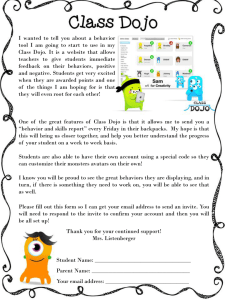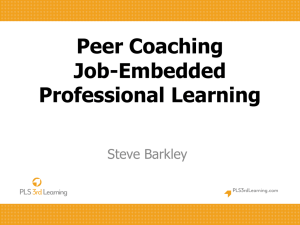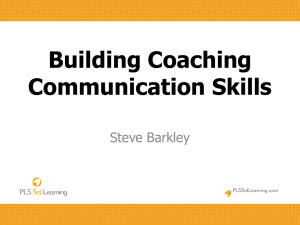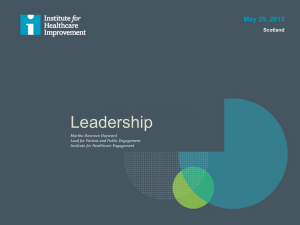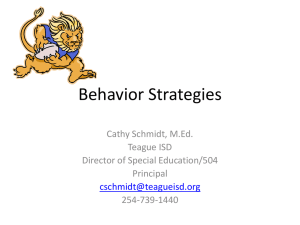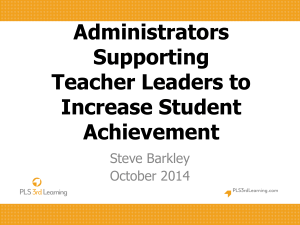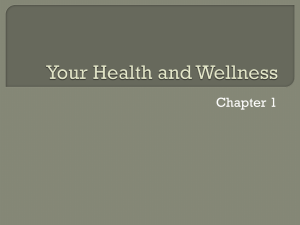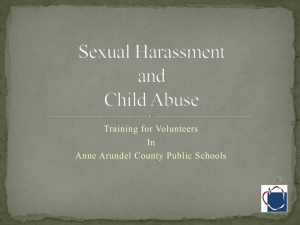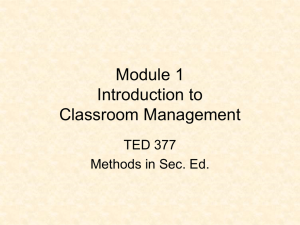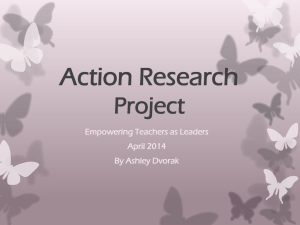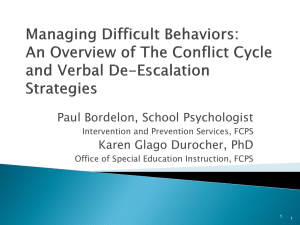NJ LF Workshop Feb 27, 2014
advertisement
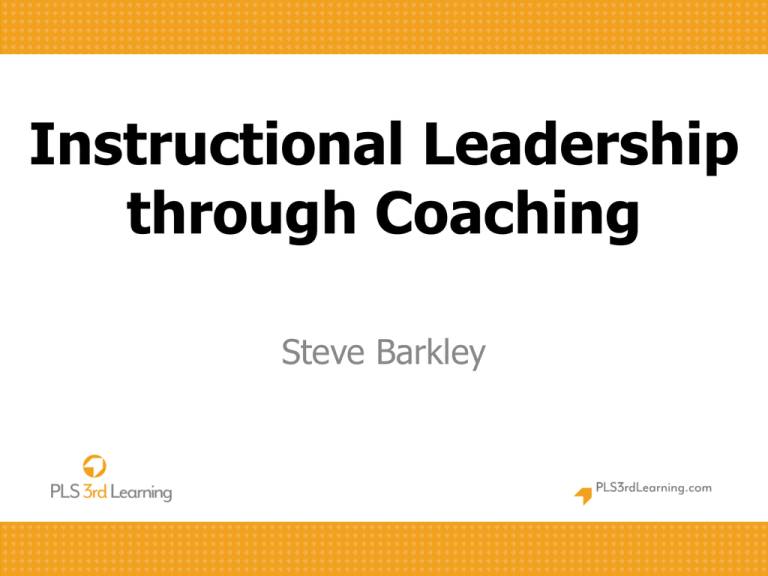
Instructional Leadership through Coaching Steve Barkley School Change Source: Model developed by Stephen Barkley Student Achievement What is your definition of student achievement? STUDENT ACHIEVEMENT GOALS • ACADEMICS - knowledge and skills to be successful in school and life. • LIFE SKILLS - aptitude, attitude and skills to lead responsible, fulfilling and respectful lives. • RESPONSIBILITY TO THE COMMUNITY - attributes that contribute to an effective and productive community and the common good of all. School Change Source: Model developed by Stephen Barkley Student Behaviors What student behaviors need to be initiated or increased to gain the desired student achievement? Student Behaviors • Reading as choice • Writing • Finding problem to solve • Researching • Asking questions • Following a passion • Persevering/Effort • Working independently and collaboratively • Taking risks in learning • Using technology to research and produce • Adapting to change Teacher Behaviors What teacher behaviors are most likely to generate these student behaviors? Teacher Behaviors • Teach the desired student behavior. • Model the desired student behavior. The Formula… Effort x Ability = Success Manageable Task Teacher Relationships What changes need to occur in how teachers work with each other to support the needed teacher behaviors? Teacher Relationships • • • • Parallel Play Adversarial Relationships Congenial Relationships Collegial Relationships Roland S. Barth Relationships Within the Schoolhouse ASCD 2006 School Change Source: Model developed by Stephen Barkley Leader Behaviors What leadership behaviors are needed to support the desired staff, teacher, parent, and student behaviors? Instructional Coaching EVALUATION Outside Criteria MENTORING SUPERVISION PEER COACHING Teacher’s Choice Pre-observation Conference Observation Post-observation Conference The Environmental Influences C lo se d O pen Q u e stio n C o n trols d ire ctio n A n sw e r C on tro ls d ire ctio n OPEN ENVIRONMENT • • • • • • • • Uncover Thinking Opinions Problem Solving Creativity Critical Thinking Discussion Emotions/Feeling Counseling CLOSED ENVIRONMENT • • • • • • • • Right/Wrong One Way Sequence Skills Test Control Authority Quick Fix The Environmental Influences C lo se d O p en Q u estion Controls direction An sw er C on trols direction Right/Wrong Uncover Thinking One Way Opinions Sequence Problem Solving Skills Creativity Test Critical Thinking Control Discussion Authority Emotions/Feeling Quick Fix Counseling E va lu a tive C re a tive Pe rso n a lize d V is io n - M is s io n S tr a te g y - C u rric u lu m Agenda T a c tic s - L e s s o n P la n O p e ra tio n s - T e a c h in g S k ills Fo cu s LISTENING TEST • You believe that . . . . . . . . . . . • My focus is . . . . . . . . . . . . . . . • I should notice . . . . . . . . . . . . Confirmatory Paraphrase Fact Attitude/Feeling Intention Commitment Coach: That was a difficult lesson Coachee: It’s frustrating to put so much time into planning a lesson and then not have it go well. PRACTICE Teacher: My students won’t read an assignment so I don’t see how I can do anything other than present information in class hoping they will remember some of it. Teacher: My students won’t read an assignment so I don’t see how I can do anything other than present information in class hoping they will remember some of it. Fact You have not been able to get many of the students to work outside of class. Teacher: My students won’t read an assignment so I don’t see how I can do anything other than present information in class hoping they will remember some of it. Feeling You are worried that presenting information in class won’t get the student achievement that you want. Teacher: My students won’t read an assignment so I don’t see how I can do anything other than present information in class hoping they will remember some of it. Attitude If students read outside of class you would teach very differently. You want to find a way to get them to read outside of class. Gripes to Goals Gripes to Goals Too many students don’t care about their grades…there is no way to motivate them to work. Failing them isn’t a threat. Gripes to Goals Too many students don’t care about their grades… there is no way to motivate them to work. Failing them isn’t a threat. • You have a strong desire for your students to do well. • Grades just don’t seem to be it. • You see a need to find a different way to motivate your students. Making Suggestions Phrase Positively Clear and Specific Congruent Pay-off Compliment Praise Approval Approval H.I.P. Personalize Cite the Specifics Observation Form Barth: By collegiality I mean four things • One, teachers talking with one another about the work they do -- talking in faculty meetings, in hallways, in classrooms, at the dinner table about practice. • Second, sharing that craft knowledge, shouting it from the mountaintop, and honoring it when someone else is sharing it. • Third, making our practice mutually visible. That is, you come into my classroom and watch me teach seventh-grade biology and I come into your classroom and watch you teach ninth-grade geometry, and, afterward, we talk about what we are doing and why, and what we can learn from each other. • Above all, collegiality means rooting for the success of one another. If every adult in the school is rooting for you, when the alarm clock rings at six a.m., you jump out of bed to go to that school.
